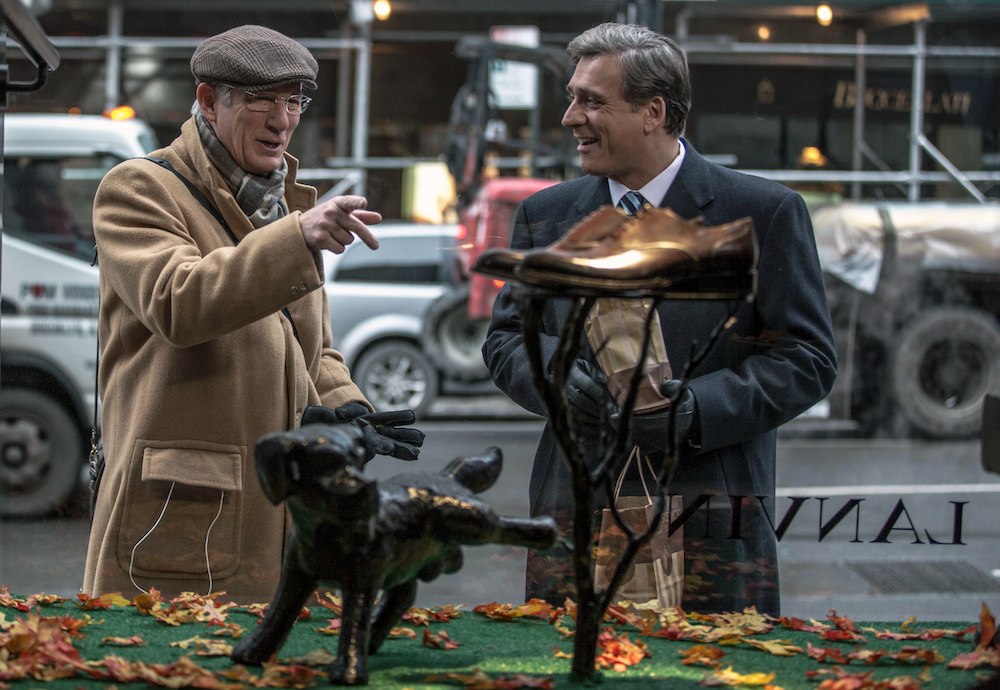Norman review - revelatory Richard Gere in mesmerising New York tale | reviews, news & interviews
Norman review - revelatory Richard Gere in mesmerising New York tale
Norman review - revelatory Richard Gere in mesmerising New York tale
Absorbing parable about the pitfalls of making connections in high places

“You’re like a drowning man trying to wave at an ocean liner,” says lawyer Philip (Michael Sheen) to his uncle Norman Oppenheimer (Richard Gere as you’ve never seen him before – a revelation). “But I’m a good swimmer,” replies Norman, feverishly making notes on a napkin.
From the first snowy scenes around Central Park and the Upper West Side, the city and the portrait of Norman’s place in it are mesmerising. You can almost taste that bitter wind cutting into his ruddy face as he endlessly walks the icy streets, ear-buds in (Israeli director Joseph Cedar, in his first English-language film, has made Gere’s ears stick out, which somehow makes all the difference), placing calls from Starbucks, Staples, Bergdorf’s shoe department, anywhere he can find.
His tweed cap, scarf and camel coat are smart enough but they seem to be the only clothes he has. We’re never told where he lives: he may even be homeless. The only time we see him eating is when he tucks into crackers and a jar of pickled herring at his synagogue. The rabbi (a tetchy Steve Buscemi) treats him with tolerance. Others, like Bill Kavish (Dan Stevens), the assistant to a mega-financier, just tell him to get lost, which Oppenheimer interprets as a hugely successful conversation. There’s something lonely and likeable, as well as painful, about his desperation, and Gere’s performance is the essence of subtlety. It's clear, as it was in Time Out of Mind and Arbitrage, that he's getting better and better with age.  Norman is friends with everyone and no one until he homes in on Micha Eshel, played by the superb Lior Ashkenazi (pictured above, right) who also starred in Cedar’s Footnote. Eshel is a minor Israeli politician, alone in New York for a few days. Norman follows him from a trade conference to a Lanvin boutique and worms his way into his confidence by name-dropping, always mentioning his wife and daughter – whom we never see – as part of the business connection. Eshel, rather surprisingly, listens and talks about his own career struggles and addiction to power. Norman ends up buying Eshel some $1,000 shoes. ‘”Best investment I ever made,” Norman says later. But is it?
Norman is friends with everyone and no one until he homes in on Micha Eshel, played by the superb Lior Ashkenazi (pictured above, right) who also starred in Cedar’s Footnote. Eshel is a minor Israeli politician, alone in New York for a few days. Norman follows him from a trade conference to a Lanvin boutique and worms his way into his confidence by name-dropping, always mentioning his wife and daughter – whom we never see – as part of the business connection. Eshel, rather surprisingly, listens and talks about his own career struggles and addiction to power. Norman ends up buying Eshel some $1,000 shoes. ‘”Best investment I ever made,” Norman says later. But is it?
This totally absorbing film has many cringe-making moments. One of the worst – or best – is when he gatecrashes a dinner party at the super-luxe house of Arthur Taub, a New York bigwig (Josh Charles) who Norman hopes to connect with Eshel. Taub has to spell it out: “This is my private home, you can’t just walk in and sit at my table.” Norman is like a deer in the headlights. But he transforms even that humiliation into a boast to his rabbi: “I was at Arthur Taub’s house.” Which leads the rabbi to believe, when the synagogue needs $14 million, that Norman may come in useful after all. Bad idea.
But for a time, it seems that the investment has paid off. Eshel becomes prime minister of Israel and – still wearing the shoes – miraculously recognises Norman at a reception. Suddenly everyone really does want to know him. There are wonderful split-screen scenes of Norman making those connections (from Starbucks and the street, as usual) while highly placed parties in New York and Israel hope his promises are for real. But be careful what you wish for. A lawyer (a pale, tightly wound, English-accented Charlotte Gainsbourg) is the only one who catches on to the dubious nature of Norman’s transactions. His “What do you need? I’ll help you get it” spiel cuts no ice with her – she doesn’t need connections. Norman’s craving to be liked does, indeed, lead to his tragic fall, accompanied at the end by a snatch of something that sounds very like the theme tune to Curb Your Enthusiam. But it's a New York story, through and through.
The future of Arts Journalism
You can stop theartsdesk.com closing!
We urgently need financing to survive. Our fundraising drive has thus far raised £49,000 but we need to reach £100,000 or we will be forced to close. Please contribute here: https://gofund.me/c3f6033d
And if you can forward this information to anyone who might assist, we’d be grateful.

Subscribe to theartsdesk.com
Thank you for continuing to read our work on theartsdesk.com. For unlimited access to every article in its entirety, including our archive of more than 15,000 pieces, we're asking for £5 per month or £40 per year. We feel it's a very good deal, and hope you do too.
To take a subscription now simply click here.
And if you're looking for that extra gift for a friend or family member, why not treat them to a theartsdesk.com gift subscription?
more Film
 Iron Ladies review - working-class heroines of the Miners' Strike
Documentary salutes the staunch women who fought Thatcher's pit closures
Iron Ladies review - working-class heroines of the Miners' Strike
Documentary salutes the staunch women who fought Thatcher's pit closures
 Blu-ray: The Man in the White Suit
Ealing Studios' prescient black comedy, as sharp as ever
Blu-ray: The Man in the White Suit
Ealing Studios' prescient black comedy, as sharp as ever
 The Woman in Cabin 10 review - Scandi noir meets Agatha Christie on a superyacht
Reason goes overboard on a seagoing mystery thriller
The Woman in Cabin 10 review - Scandi noir meets Agatha Christie on a superyacht
Reason goes overboard on a seagoing mystery thriller
 London Film Festival 2025 - crime, punishment, pop stars and shrinks
Daniel Craig investigates, Jodie Foster speaks French and Colin Farrell has a gambling habit
London Film Festival 2025 - crime, punishment, pop stars and shrinks
Daniel Craig investigates, Jodie Foster speaks French and Colin Farrell has a gambling habit
 I Swear review - taking stock of Tourette's
A sharp and moving tale of cuss-words and tics
I Swear review - taking stock of Tourette's
A sharp and moving tale of cuss-words and tics
 A House of Dynamite review - the final countdown
Kathryn Bigelow's cautionary tale sets the nuclear clock ticking again
A House of Dynamite review - the final countdown
Kathryn Bigelow's cautionary tale sets the nuclear clock ticking again
 theartsdesk Q&A: Idris Elba on playing a US President faced with a missile crisis in 'A House of Dynamite'
The star talks about Presidential decision-making when millions of lives are imperilled
theartsdesk Q&A: Idris Elba on playing a US President faced with a missile crisis in 'A House of Dynamite'
The star talks about Presidential decision-making when millions of lives are imperilled
 Urchin review - superb homeless drama
Frank Dillane gives a star-making turn in Harris Dickinson’s impressive directorial debut
Urchin review - superb homeless drama
Frank Dillane gives a star-making turn in Harris Dickinson’s impressive directorial debut
 Mr Blake at Your Service review - John Malkovich in unlikely role as an English butler
Weird comedy directed by novelist Gilles Legardinier
Mr Blake at Your Service review - John Malkovich in unlikely role as an English butler
Weird comedy directed by novelist Gilles Legardinier
 Don't Let's Go to the Dogs Tonight review - vivid adaptation of a memoir about a Rhodesian childhood
Embeth Davidtz delivers an impressive directing debut and an exceptional child star
Don't Let's Go to the Dogs Tonight review - vivid adaptation of a memoir about a Rhodesian childhood
Embeth Davidtz delivers an impressive directing debut and an exceptional child star
 One Battle After Another review - Paul Thomas Anderson satirises America's culture wars
Leonardo DiCaprio, Teyana Taylor, and Sean Penn star in a rollercoasting political thriller
One Battle After Another review - Paul Thomas Anderson satirises America's culture wars
Leonardo DiCaprio, Teyana Taylor, and Sean Penn star in a rollercoasting political thriller

Add comment